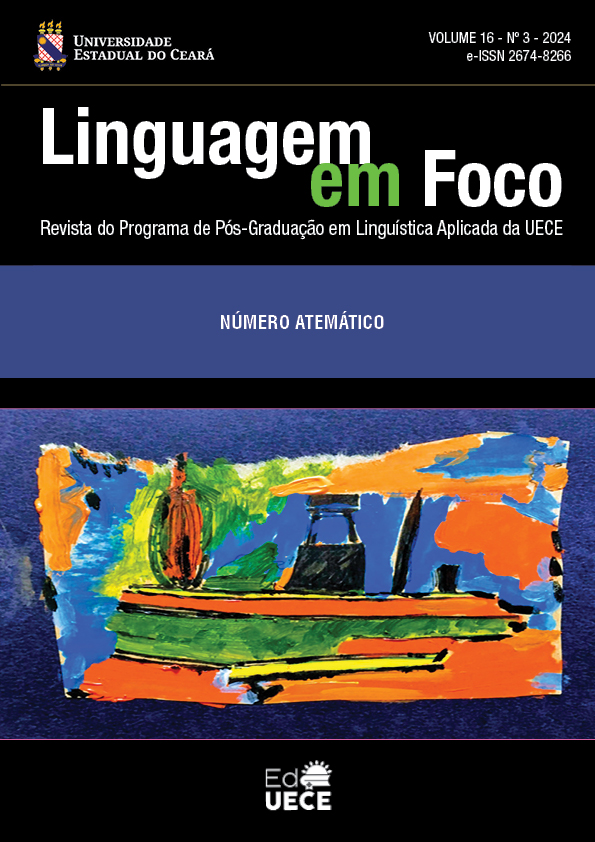Produção textual colaborativa entre IH e IAG
Uma experiência com o Story.com
DOI :
https://doi.org/10.46230/lef.v16i3.13919Mots-clés :
multiletramentos, inteligência artificial generativa, produção textualRésumé
O processo de ensino e aprendizagem na era da cultura digital, com acesso a diferentes plataformas e mídias, tem ampliado formas de interação para além do espaço escolar. Isso é possível porque práticas multimidiáticas de linguagem transpõem limites físicos e estabelecem múltiplas conexões, inclusive entre seres humanos e máquinas. Cientes disso, neste artigo, objetivamos analisar uma experiência de produção textual colaborativa entre Inteligência Humana (IH) e Inteligência Artificial Generativa (IAG) com o uso da plataforma Story.com. Essa experiência foi desenvolvida em uma oficina de multiletramentos com uma turma multisseriada de 4o e 5o anos de uma escola pública na zona rural de Mossoró/Rio Grande do Norte/Brasil. Fundamentado teórico-metodologicamente nos estudos de letramento de vertente sociocultural (Kleiman, 2005; Oliveira, 2008; Tinoco, 2008), na pedagogia de multiletramentos (Kalantzis; Cope; Pinheiro, 2020) e na Linguística Aplicada (Scheifer; Rego, 2020), este artigo de base qualitativa analisa um recorte de dados que focaliza a escrita colaborativa entre dois estudantes, inicialmente, e, depois, entre eles e o Story.com. Os resultados dessa análise sinalizam que a escrita colaborativa entre IH e IAG requer a elaboração de sucessivos prompts para a geração dos contos, o desenvolvimento de práticas de leitura e análise crítica das versões produzidas e o processual refinamento do conto multimodal. Sendo assim, compreendemos que o uso da IAG pode possibilitar o desenvolvimento de artefatos multimidiáticos, como textos multimodais, contribuindo para a ampliação da produção textual na contemporaneidade.
Téléchargements
Références
BRASIL. Ministério da Educação. Base Nacional Comum Curricular: Educação é a Base. Brasília: DF, 2017. Disponível em: http://basenacionalcomum.mec.gov.br/images/BNCC_EI_EF_110518_versaofinal_site.pdf. Acesso em: 07 ago. 2024.
FILATRO, A.; CAVALCANTI, C. C. Metodologias inov-ativas na educação presencial, a distância e corporativa. São Paulo: Saraiva Educação, 2018.
HAMILTON, M. Expanding the new literacy studies: using photographs to explore literacy as social practice. In: BARTON, David; HAMILTON, M.; IVANIC, R. (Org.). Situated literacies. London: Routledge, 2000.
KALANTZIS, M.; COPE, B.; PINHEIRO, P. Letramentos. Campinas: Editora da Unicamp, 2020.
KLEIMAN, A. B. Preciso ‘ensinar’ o letramento? Não basta ensinar a ler e a escrever? Brasília/DF: MEC; Campinas/ SP: Cefiel. Instituto de Estudos da Linguagem. Unicamp. Coleção Linguagem e Letramento em foco. Linguagem nas séries iniciais, 2005. Disponível em:https://oportuguesdobrasil.wordpress.com/wp-content/uploads/2015/02/kleiman-nc3a3o-basta-ensinar-a-ler-e-escrever.pdf. Acesso em: 28 ago. 2024.
KLEIMAN, A. B. Professores e Agentes de Letramento: identidade e Posicionamento Social. Filol. linguíst. port., n. 8, p. 409-424, 2006. DOI: 10.11606/issn.2176-9419.v0i8p409-424. Disponível em: https://revistas.usp.br/flp/article/view/59763. Acesso em: 15 ago. 2024.
MAGALHÃES, A. L. O que é alucinação de IA? São Paulo: Canaltech, 2024. Disponível em: https://canaltech.com.br/inteligencia-artificial/o-que-e-alucinacao-de-ia/. Acesso em: 10 ago. 2024.
MENEZES, V.; SILVA, M. M.; GOMES, I. F. Sessenta anos de Linguística Aplicada: de onde viemos e para onde vamos. In: PEREIRA, R.C.; ROCA, P. (org). Linguística aplicada: um caminho com diferentes acessos. São Paulo: Contexto, 2009, p. 25-50.
OLIVEIRA, M. do S. Projetos: uma prática de letramento no cotidiano do professor de língua materna. In: OLIVEIRA, M. do S.; KLEIMAN, A. B. (org). Letramentos múltiplos: agentes, práticas, representações. Natal: EDUFRN, 2008, p. 93-118.
ROJO, R.; MOURA, E. Multiletramentos na escola. São Paulo: Parábola, 2012.
SANTOS-MARQUES, I. B. de A.; KLEIMAN, A. B. Projetos, oficinas e práticas de letramento: leitura e ação social. Revista Com Sertões, Juazeiro, v.7, n.1, jul.-dez. p. 16-34, 2019. Disponível em: https://www.revistas.uneb.br/index.php/comsertoes/article/view/7275. Acesso em: 26 ago. 2024.
SCHEIFER. C. L.; REGO, M. C. S. Da redundância à gambiarra: reflexões para o ensino de línguas na era digital. In: LEFFA, V. J.; FIALHO, V. R.; BEVILÁQUA, A. F.; COSTA, A. R. (org.). Tecnologias e ensino de línguas: uma década de pesquisa em Linguística Aplicada. Santa Cruz do Sul: EDUNISC, 2020. p.109-128.
SILVA, F. G. da. Desinformação tem tratamento: leitura crítica contra a pandemia de Fake News e pós-verdade. 2023. 217f. Tese (Doutorado em Estudos da Linguagem) - Centro de Ciências Humanas, Letras e Artes, Programa de Pós-graduação em Estudos da Linguagem, Universidade Federal do Rio Grande do Norte, Natal, 2023. Disponível em: https://repositorio.ufrn.br/handle/123456789/57862. Acesso em: 26 ago. 2024.
TINOCO, G. M. A. de M. Projetos de letramento: ação e formação de professores de língua materna. 2008. 254f. Tese (Doutorado em Linguística Aplicada). Instituto de Estudos da Linguagem, Universidade Estadual de Campinas, Campinas, 2008. Disponível em: https://repositorio.unicamp.br/acervo/detalhe/436194. Acesso em: 26 ago. 2024.
UNESCO. Guia para a IA generativa na educação e na pesquisa. 2024. Disponível em: https://repositorioaberto.uab.pt/bitstream/10400.2/16350/1/390241por.pdf. Acesso em: 10 agosto 2024.
Téléchargements
Publiée
Comment citer
Numéro
Rubrique
Licence
(c) Tous droits réservés Valéria Montenegro, Glicia Azevedo, Luciana Vieira 2025

Ce travail est disponible sous la licence Creative Commons Attribution 4.0 International .
Os autores que publicam na Linguagem em Foco concordam com os seguintes termos:
- Os autores mantêm os direitos autorais e concedem à revista o direito de primeira publicação. Os artigos estão simultaneamente licenciados sob a Creative Commons Attribution License que permite a partilha do trabalho com reconhecimento da sua autoria e da publicação inicial nesta revista.
- Os conceitos emitidos em artigos assinados são de absoluta e exclusiva responsabilidade de seus autores. Para tanto, solicitamos uma Declaração de Direito Autoral, que deve ser submetido junto ao manuscrito como Documento Suplementar.
- Os autores têm autorização para disponibilizar a versão do texto publicada na Linguagem em Foco em repositórios institucionais ou outras plataformas de distribuição de trabalhos acadêmicos (ex. ResearchGate, Academia.edu).





























